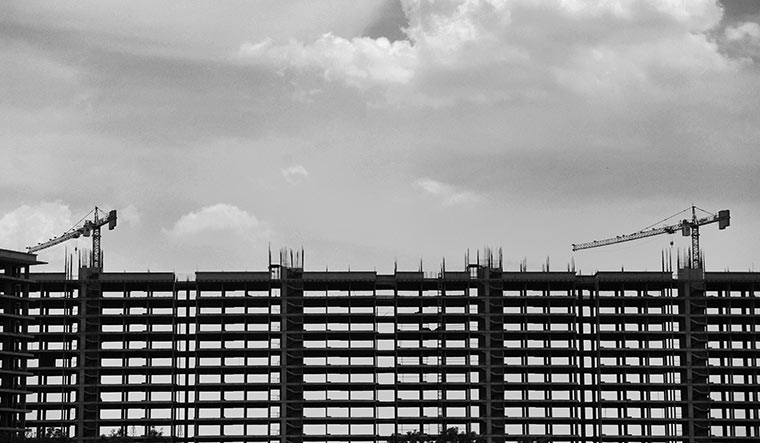The COVID-19 pandemic and the lockdowns announced to curb the spread of the virus since March have hit the real estate industry hard. The housing market, which had already been slow even before the pandemic hit, has been among the worst affected, while the commercial office market—in strong demand last year—has also suffered amid the wider economic uncertainties fuelled by the coronavirus.
In the first half of 2020, housing sales in India’s top eight cities more than halved to 59,538 units, a decadal low, according to data released by Knight Frank, a real estate consulting firm. In the first half of 2019, 129,285 housing units had been launched.
The COVID-19 driven slump in demand has also had an impact on new launches, which fell 46 per cent year-on-year between January-June to 60,489 units, compared with 111,175 units, launched last year. “The residential real estate sector, which was going through a rough patch has got severely hit by the current crisis,” said Shishir Baijal, chairman and MD of Knight Frank India.
If the first half were to be broken into two quarters, then data shows that sales in the January-March quarter declined 27 per cent. However, the April-June quarter saw sales plunge 84 per cent as mandatory lockdowns were in force in most cities. While sales in Pune and Bengaluru fell 73 per cent and 74 per cent respectively, in NCR, Chennai and Kolkata, there were no sales at all.
This will further put pressure on the already high unsold inventory. As of June 30, there were 446,787 unsold housing units in the top eight cities. Mumbai and NCR alone had an unsold inventory of 150,154 and 118,064 units respectively. Knight Frank estimates that it will take over 10 quarters just to sell this unsold inventory.
The near-term outlook does not look great for the residential sector. The economy is expected to shrink this year and many firms have cut salaries or laid-off people. In these uncertain times, housing demand is unlikely to see any swift recovery and therefore, there is a need for the government to step in and help the sector, said Baijal.
“With income uncertainty for the future, demand for housing will take a hit. While the RBI has announced the much required liquidity injecting measures and cut in policy interest rate, there is an urgent need for the government to come up with some demand boosting measures for the real estate sector.”
The commercial market, which has been a bright spot for years in India’s realty market, too, has been hit hard by the pandemic.
In the first half of this year, office leasing activity declined 37 per cent to 17.2 million square feet from 27.4 million square feet. Pune, NCR, Bengaluru and Hyderabad were among the worst hit, with demand falling 42 per cent to 47 per cent.
New office space supply at 17.3 million square feet, were down 27 per cent from 23.9 million square feet in the same period, a year ago.
“With the economic uncertainties creating significant headwinds, we expect the office space take up to remain cautious. Most occupiers are expected to hesitate in committing to expansion in the current market scenario and may delay their leasing decisions for later,” said Baijal.
In the last few years, there has been a strong demand for quality office space, especially from technology companies. That has attracted many foreign investors to the Indian market. But now, as most people still work from home, companies exploring whether some roles could permanently be shifted to work from home environment and social distancing the norm wherever offices are reopening, the commercial market is likely to face many challenges, this year at least.
“For the office market, it will be a wait and watch till a more permanent solution to this pandemic is found,” Baijal added.



